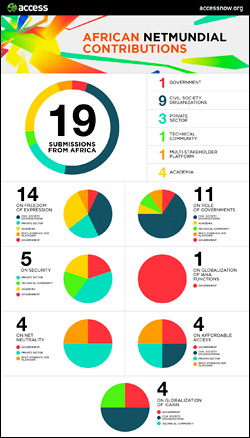


|
||
|
||
The internet affects every individual in this world whether directly or indirectly. For example, a medical professional somewhere in Goma, Congo might access the internet to read and post reviews to current medication available and this might have an impact on the kind of medication that he/she recommends to the patient, whether the patient has access to affordable internet or not. Since the internet affects everyone, Africans citizens who are aware of internet governance discussions, expect African stakeholders to engage in these discussions.
Specifically, we are looking at African stakeholder’s actions in taking part in positive reform agenda that: preserves the interoperable/global nature of the internet; secures and facilitates the exercise of human rights for all users without discrimination or regard for where they happen to connect; is inclusive in decision-making so that policies reflect the public interest.
One can note that African participation has been low as seen in the 2013 African IGF Report. African IGF participants totaled to only 195 people, including government officials, and representatives from private sector, civil society, and regional and international organizations, from 29 countries (Africa has 54 countries). The 2012 African IGF Report cites similar stakeholders but with 31 countries physically present at the meeting. Does this mean that African stakeholders never take these discussions seriously, or that they are ill-equipped to handle internet governance discussions even when they are held in Africa? In the past it has been stated that “[the] lack of an effective outreach to Africa is one of direct causes of the very low participation of Africa.”
This is the first in a series of blog posts that will analyse common positions and differences in contributions from African stakeholders and the major international internet governance discussions including: the Council Working Group on international Internet-related public policy issues (CWG-Internet), the ITU-facilitated multistakeholder preparatory platform for the review of the World Summit on Information Society (WSIS+10), and the UN Working Group on Enhanced Cooperation (WGEC) under the auspices of the Commission on Science and Technology for Development (CSTD), as well as other internet governance discussions that are meant to shape the internet’s future.
NETmundial (Global Multistakeholder Meeting on the Future of Internet Governance)
Background: NETmundial is the Global Multistakeholder Meeting on the Future of Internet Governance that is scheduled for April 23rd and 24th 2014 in Sao Paulo, Brazil. It will focus on crafting internet governance principles and proposing a roadmap for the further evolution of the internet governance ecosystem. It is organized in a partnership between the Brazilian Internet Steering Committee (CGI.br) and /1Net, a forum that gathers international entities of the various stakeholders involved with internet governance. Twelve countries are supporting the NETmundial as members of the High Level Multistakeholder Committee: Brazil, Argentina, France, Ghana, Germany, India, Indonesia, South Africa, South Korea, Tunisia, Turkey and the United States among other multistakeholder organizations.
NETmundial had an open submission process that allowed for all stakeholders to submit contributions on both internet governance principles and a roadmap for reform. Over 180 submissions were received, with a total of 19 coming from Africa, including comments from government, civil society, the technical community and the private sector. It is important to note that in Africa there was only 1 government submission (Tunisia) to NETmundial. The breakdown of contributions by sector is 1 government, 9 civil society organizations, 3 from private sector, 1 from the technical community, 1 from a multi-stakeholder platform and 4 from academia.
 African NETmundial Contributions
African NETmundial Contributions
Credit: Access, Click to EnlargeThe submissions can further be categorised under the following themes:
• Security (5)
• Freedom of expression/human rights (14)
• Globalization of ICANN (4)
• Role of governments (11)
• Net neutrality (4)
• Globalization of IANA functions (1)
• Affordable Access (4)(See specific information about the data in the infographic on the right.)
There was only one contribution that expressly mentioned the globalization of IANA functions, while all contributions discussed the importance of involving all stakeholders in internet governance processes and therefore implied support for a decentralized model of governance. Two possible exceptions include CIPIT (Academia from Kenya), which uses “multilateral” which seems to mean multistakeholder, and the Nigeria Internet Registration Association, which calls for a new World Internet Governance Organisation (WIGO), a global organization with equal participation of the government, private sector, civil society, technical community in a multistakeholder consensus building NET-NATIONS. The proposal states that “ICANN be changed to WIGO” and asserts that “the Internet ecosystem should maintain the multistakeholder approach.” Because the proposal is scarce on details, i.e. how WIGO would relate to other bodies in the internet ecosystem, it is unclear whether it is consistent with a decentralized approach.
With regards to human rights, submissions from civil society tend to place a strong emphasis on human rights and state that it is the government’s role to ensure the protection of users’ rights online, pointing to specific international standards that ought to be adhered to. Several submissions included an emphasis on affordable access and similar language on security, stability and resiliency of the internet.
Two submissions that stand out, as they address issues other African submissions did not, are those from Sudan. These submissions address the violation of US political sanctions against the neutrality of the network and the impact of ICANN being a US registered organization and its relations with countries under US trade embargo, highlighting US sanctions and their impact on free flow of information in Sudan.
This post was originally published on the Access blog on April 14, 2014 and can be found here. It was also published on the CGCS blog on April 18, 2014 here.
Sponsored byVerisign

Sponsored byCSC

Sponsored byIPv4.Global

Sponsored byWhoisXML API

Sponsored byDNIB.com

Sponsored byVerisign

Sponsored byRadix
